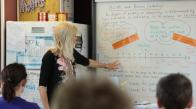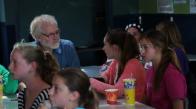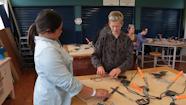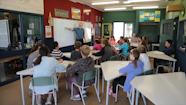Steve Jeffares and Ronnie McHale share how their students deepen conceptual understandings through integrating multiple knowledge bases.
Technology and science work well together
Transcript
Steve Jeffares: The core philosophy in our technology centre is that our technology drills across multiple knowledge bases, including science and maths, and the language, literacy. And we capitalise on every single opportunity to use whatever knowledge base is appropriate. Technology in our built world depends on science for its future. It also depends on science for its materials development across all of our industries. The technology curriculum and technological knowledge strand has in–depth associations with materials and material structure is all founded on good science. Materials characteristics as part of the construction in mechanical technologies are all founded on sound science. So we believe that by starting our students into a comprehensive but well founded science conceptual base, at year 7, sets them up for a future in technology and in careers.
Dr Ronnie McHale: All of our year 7 and 8 potential students go through that area. So it’s the brilliant vehicle for us to, as a school, as a secondary school, to introduce some science concepts down there, and make the students familiar with them, so when they enter the year 9 science they are familiar with them. We’ve managed to do that by working with our technology section, introduce concepts year by year, and then tailor make our year 9 programme, so that the first contact that we have with our new students is that subject and those concepts.
Student 1: It really helped because in year 9 I got excellence on my periodic table test, because knowing that little extra knowledge, it just helped me understand a lot better.
Steve Jeffares: We find that if we begin students with understandings around the periodic table, then they understand metals in their behaviour. We find that if they can understand the structure of an atom, electrons, protons, and electron flow it means when they’re working with electronics they are relating their circuit board to the flow of electrons and students will often say to me “My electrons aren’t flowing”. That simple understanding means that they have a grasp on electrical theory.
Student 2: We were learning about electrons because we’re making speakers and stuff and we need to learn what and how it makes the speakers go and the tap boxes go.
Student 3: In year 8 we made a speaker, the components we used were conductors, wires and that, and parallel circuits and stuff. So by the time in year 9 we were already familiar with them.
Dr Ronnie McHale: I remember one particular occasion when the very first time in fact we had done this, and I walked into my year 9 science class and electricity had been introduced that year and we were talking about electricity, "What is electricity?", and immediately one student turned around and said, “It’s electrons!” and I said “Yeah what about electrons?”, “Well it’s electrons going through wires”, so I said “What wires?”, “Copper wires”, “Where do electrons come from?”, and I got a little parody from atomic theory.
Student 4: Well I found it really helpful because it made me feel more confident in myself, it wasn’t a shock to me when I went in, it was, it wasn’t anything new, I knew plenty about it. I already have a lot of knowledge about the periodic table so I wasn’t that scared to get into science.
Steve Jeffares: We make sure that they can understand the basics of material performance based on its atomic structure. So when students are working with plastics they understand that they are heating a plastic and breaking bonds.
Student 4: And also it helped me with my peers because they came to me a lot and it made me feel more confident. Sort of being a leader, helping other people.
Dr Ronnie McHale: It’s basically all about reducing barriers for those students in science. And the results are amazing. We have probably over the last 2 years increased our uptake of level 1 science by a third, and the students that we would normally associate with non–achieving are actually achieving in science at level 1.
Student 5: When you come to college you have a head start on getting your NCEA level ones. I found it easier, than if I didn’t learn about the technologies in year 7 and 8.
Steve Jeffares: We just believe that starting them with conceptual understandings, allows them to have more in–depth understandings later on about how materials perform and behave.
Related videos
Food technology and science (03:47)
Brenda Whycherley and Vanessa Austin of Edgecumbe College approach food technology and science with a holistic view.
Building relationships with students visiting a technology centre (03:05)
Steve Jeffares and Brenda Whycherley show that building strong relationships develops confidence for their students.
A broad technology programme for year 7–8 (02:00)
Steve Jeffares and Brenda Whycherley inspire confidence in their students by offering a broad programme.
High expectations in years 7–8 technology (03:57)
Steve Jeffares shares how he inspires students to develop a love of learning.




